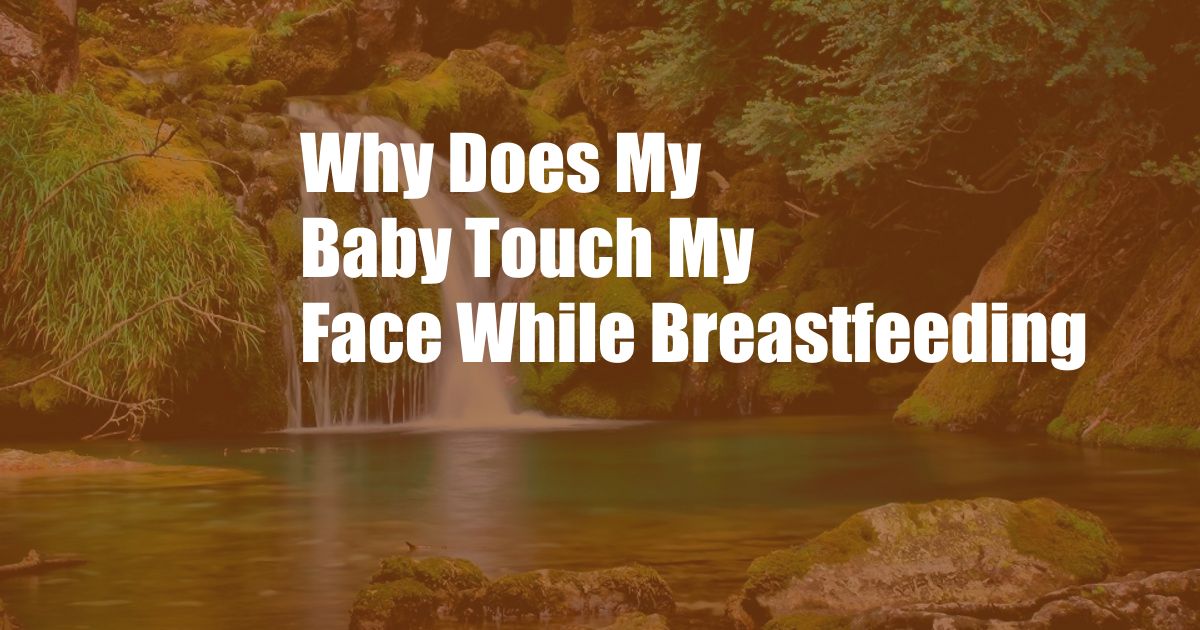
Why Does My Baby Touch My Face While Breastfeeding?
The intimate act of breastfeeding creates a special bond between you and your baby, and many mothers find it to be a time of great joy and connection. However, it’s not uncommon for babies to exhibit strange behavior during breastfeeding, such as touching the mother’s face. While this behavior can be amusing, it can also be perplexing for mothers who wonder why their baby is doing it.
In this article, we will explore the reasons why babies touch their mothers’ faces while breastfeeding and discuss some of the tips and expert advice you can follow to understand and respond to this behavior.
A Way to Communicate
One of the primary reasons why babies touch their mothers’ faces while breastfeeding is to communicate. By gently caressing your face, your baby may be trying to tell you something. They may be hungry, thirsty, or simply looking for comfort and reassurance. As you become more familiar with your baby’s cues, you will learn to interpret their facial touches and respond accordingly.
Exploring Their World
Breastfeeding provides a perfect opportunity for babies to explore the world around them. By touching your face, they are able to learn about different textures and shapes. They may be particularly interested in your nose, mouth, and eyes, as these areas are all highly sensitive and offer a variety of sensory experiences.
Feeling Secure
Breastfeeding can be a time of great comfort and safety for babies. As they latch on to your breast, they are not only receiving nourishment but also a sense of warmth and security. By touching your face, your baby may be trying to create a deeper bond with you and feel more connected to you.
Developing Fine Motor Skills
The act of touching your face can also help babies develop their fine motor skills. By using their fingers and hands to explore your facial features, they are learning how to control their muscles and coordinate their movements. This is an important step in their overall development.
Tips and Expert Advice
If your baby touches your face while breastfeeding, there are a few things you can do to respond:
- Be gentle and reassuring. Gently hold your baby’s hand or place it on your face so that they can continue to explore.
- Talk to your baby. Tell them that you love them and that you are happy to feed them.
- Avoid pulling away. If you pull away, your baby may feel rejected or insecure.
- If your baby is hungry or thirsty, feed them. If they are not hungry or thirsty, try to soothe them with a pacifier or by rocking them gently.
By following these tips, you can help your baby feel comfortable and secure while breastfeeding, while also allowing them to explore their world and develop their fine motor skills.
Frequently Asked Questions
- Q: Is it harmful for my baby to touch my face while breastfeeding?
A: No, it is not harmful for your baby to touch your face while breastfeeding. In fact, it can be a positive thing as it helps them to develop their fine motor skills and explore the world around them. - Q: Should I stop my baby from touching my face while breastfeeding?
A: No, you should not stop your baby from touching your face while breastfeeding. However, if it is making you uncomfortable, you can gently move their hand away or distract them with something else. - Q: What does it mean if my baby touches my face while breastfeeding?
A: There are many reasons why babies touch their mothers’ faces while breastfeeding. They may be hungry, thirsty, tired, or simply looking for comfort and reassurance. - Q: How can I encourage my baby to stop touching my face while breastfeeding?
A: If you are uncomfortable with your baby touching your face while breastfeeding, there are a few things you can do to encourage them to stop. You can gently move their hand away or distract them with something else.
Conclusion
So, there you have it! Babies touch their mothers’ faces while breastfeeding for a variety of reasons, from communicating their needs to exploring their world to feeling secure. By understanding these reasons, you can better respond to your baby’s behavior and create a more positive breastfeeding experience for both of you.
Are you interested in learning more about baby behavior during breastfeeding? If so, please feel free to ask questions or share your own experiences in the comments below.